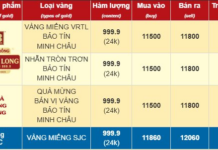The Ministry of Finance is seeking feedback on the draft Law on Personal Income Tax (amended). According to the proposal, the Ministry proposes a 20% tax rate on personal income tax for resident individuals’ income from real estate transfers, calculated on a per-transfer basis.
If the purchase price and related transfer costs cannot be determined, the tax will be calculated based on the holding period. The holding period is calculated from the time the individual acquires ownership or the right to use the real estate (from the effective date of the new Personal Income Tax Law) to the time of transfer.
Taxation should target the right subjects
Dr. Nguyen Ngoc Tu, a lecturer at the Hanoi University of Business and Technology, shared with reporters that the proposed 20% tax rate on real estate transfer income is a return to the true nature of personal income tax. In other words, tax should be levied on income, not revenue – meaning that even if a loss is incurred, tax must still be paid.
While a 20% tax rate is temporarily acceptable, it should be comparable to the corporate income tax rate. However, Dr. Tu noted that reasonable expenses with invoices and vouchers should be deductible for taxpayers, such as brokerage fees, bank interest, and renovation costs.
Furthermore, in cases where real estate has been purchased a long time ago, say 20 years, even with documents verifying the purchase price, the current selling price could be ten times higher due to inflation. Therefore, applying a 20% tax rate based on the difference between the purchase and selling prices would be unreasonable and disadvantageous for taxpayers.

The expert argued that personal income tax should only be levied on business cases and not on individuals selling their homes due to life necessities. Photo: Hoang Ha |
For such cases, the expert proposed a flexible tax mechanism, suggesting that taxpayers be given the right to choose between two options: either paying 20% tax on profits or a fixed tax rate of 2% on the selling price as currently practiced.
He emphasized that personal income tax should only target those engaged in business activities. It should not be imposed on individuals selling their homes due to life necessities, such as funding a child’s education abroad, covering medical expenses, or relocating from Vung Tau to Ho Chi Minh City, which requires a change of residence. Similarly, when individuals improve their financial situation, they may sell their smaller home to purchase a larger one, or they may choose to sell their home in old age to distribute the proceeds to their children and grandchildren.
“Such cases should not be considered income generation and should not be subject to personal income tax, as it contradicts the very nature of this tax. Clear regulations must be established in the law,” argued Dr. Tu.
Regarding cases where the purchase price and related transfer costs cannot be determined, resulting in tax calculation based on the holding period, such as a 10% tax on the selling price for properties held for less than two years to prevent speculation, the expert believed that this solution was “more harmful than beneficial” and “contradicted the very principle of the law.”
“The principle states that a 20% tax rate should be applied to profits. All calculations must adhere to this principle. Why, in the absence of invoices, is a completely different tax rate applied to the selling price? It is unfair and unreasonable for one individual with invoices to pay 20% tax on profits while another without invoices may have to pay 10% on the entire selling price,” he analyzed.
Moreover, he warned that this measure would not only fail to curb speculation but could also become a factor driving up prices, making it even more challenging for young people and salaried workers to afford housing.
“The Personal Income Tax Law only taxes generated income. To effectively combat real estate speculation, a law on asset tax should be enacted,” he suggested.
The 20% tax rate and market ‘purification’
Mr. Nguyen Quoc Anh, Deputy General Director of Batdongsan.com.vn, opined that imposing a 20% tax rate on real estate transfer profits is an inevitable trend globally, and it is only a matter of time before it is implemented in Vietnam.
“Many countries have already adopted this approach. Japan, for example, levies a 39% tax on profits if a house is sold within five years. Vietnam’s proposal is not unreasonable; in fact, it is quite sensible. However, its application requires extremely careful consideration,” said Mr. Quoc Anh.
According to him, the biggest challenge lies in timing and data. “To effectively implement this policy, we need a transparent database of purchase and sale prices and associated costs. Otherwise, the policy will be obscure and dangerous. Moreover, in a market where supply and demand are mismatched, this tax burden is likely to be passed on to the final buyer,” he pointed out.
He predicted that if this policy were adopted, it would lead to a significant “purification” of the market. Real estate investment would then become a true financial investment.
“Investors would need to consider cash flow, profits, and alternatives. Short-term investors, ‘wave riders’, and those lacking knowledge would be eliminated. Those who remain would be genuine investors who understand the value, potential, and cash flow of real estate,” emphasized Mr. Quoc Anh.
Nguyen Le
– 09:13 29/07/2025
A Billion-Dollar Export Industry Calls for VAT Exemption
The pepper and seafood industries, two of Vietnam’s key export sectors, have petitioned the government to revise its value-added tax (VAT) policies, specifically advocating for the exemption of input tax on exported goods.
KAFI Expert: Vietnam’s Stock Market Outlook Remains Highly Promising in the Near Term
“At the seminar titled “Investment Opportunities in the Last 6 Months of 2025,” experts from KAFI Securities argued that the “fab four” pillars, with a focus on Resolution 68, will be the key to addressing the uncertainties and instability that the economy has been experiencing. In the short term, the outlook for the Vietnamese stock market is very promising.”
The Curious Case of the Second Property Tax Proposal: What Does the Ministry of Finance Have to Say?
The Ministry of Finance is actively engaged in identifying challenges and gaps in the implementation of tax policies related to real estate. They are committed to reporting these findings to the relevant authorities to ensure a seamless and efficient process in the industry.










































